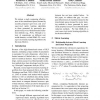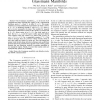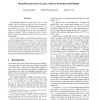3006 search results - page 74 / 602 » Dimensionality reduction and generalization |
ACL
2010
13 years 8 months ago
2010
We initiate a study comparing effectiveness of the transformed spaces learned by recently proposed supervised, and semisupervised metric learning algorithms to those generated by ...
GLOBECOM
2007
IEEE
14 years 4 months ago
2007
IEEE
—The Grassmann manifold Gn,p (L) is the set of all p-dimensional planes (through the origin) in the n-dimensional Euclidean space Ln , where L is either R or C. This paper consid...
FOCS
2003
IEEE
14 years 3 months ago
2003
IEEE
The doubling constant of a metric space (X, d) is the smallest value λ such that every ball in X can be covered by λ balls of half the radius. The doubling dimension of X is the...
ICML
2003
IEEE
14 years 10 months ago
2003
IEEE
We investigate how random projection can best be used for clustering high dimensional data. Random projection has been shown to have promising theoretical properties. In practice,...
ICONIP
2007
13 years 11 months ago
2007
Abstract. Principal component analysis (PCA) is a widely used technique for data analysis and dimensionality reduction. Eigenvalue decomposition is the standard algorithm for solvi...



